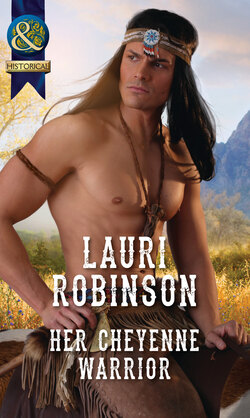Читать книгу Her Cheyenne Warrior - Lauri Robinson - Страница 9
ОглавлениеPrologue
January 1864, Land of the Northern Cheyenne
The gathering brought leaders from bands near and far, despite the snow-covered grounds and days of short light. For some the journey had been long and difficult, but the attacks against many tribes on land to the south and east had required the tribal council to join together. The harmony and peace that the Tsitsistas—The People—sought and held in high regard was once again being challenged. Not just by the white men, but by younger members of the bands.
Black Horse listened with intent as both the elder and the younger chiefs spoke of conflicts with the white men, of sweeping illnesses and attacks that affected not only the Cheyenne, but threatened bands of all the Nations. Chosen by members of this council eight years ago to be the leader of The Horse Band, Black Horse was known for his slow-to-rise temper. He did not rile easy, but when he did, he was a fierce warrior whom few dared oppose, which meant that his opinions were respected and sought after. But on this day he could not deny the shift in attitudes of many of the leaders. Several Great Chiefs, those of the older generation, were absent; they had departed this earth, some killed in attacks, others dead from the white man’s illnesses. The younger generation that had replaced them were not following the traditional path of advocating for peace.
Several of the these leaders wore war shirts made of deerskin and decorated with hammered silver coins taken from white men, and they demanded revenge with a ferocity more in line with the Southern Cheyenne than the northern bands. Black Horse was of the younger generation but he was not a new leader, and his values had been learned from those who had come before him. His heart and soul and his vision had been challenged by the white man, and at times still weighed heavy inside him, despite his commitment to peace.
While the smoking pipe was passed around the circle, he listened through the long hours of arguments and suggestions. Although he could understand the anger and frustration of those demanding more direct action, his overall view remained unaltered. Believing that the best plan for prosperity was to remain steadfast to the way of life The People had always known, Black Horse chose his words wisely.
“Tsitsistas,” he started slowly, while nodding to include each leader sitting around the large circle, “are of small number because we know that Mother Earth can only host so many of her children. Just as the grass can only feed a specific number of buffalo, elk and deer. If there are too many of any one kind, some will starve, die, until Mother Earth can rebalance the numbers again. We do not know this number, only Mother Earth has this knowledge, but Tsitsistas should remain small in number so all can eat rather than see some starve.”
“Too many Tsitsistas have died,” Otter Hair argued. “The white man’s sickness and the battles they rage have made our number even smaller. Soon we will disappear. This is the white man’s wish, and we must stop them before none are left.”
There were times when looking another directly in the eye was considered bad manners, but not when disciplining. Black Horse leveled a glare upon Otter Hair—named for the strips of otter fur braided into his hair—until the other leader dipped his chin, acknowledging that Black Horse had not given permission for another to speak. He would not rise to anger during a tribal council, but neither would he tolerate misbehavior. To interrupt another was always bad manners and never allowed.
He held silent long enough for all to understand his displeasure with Otter Hair before saying, “The death of every Cheyenne, of every brother, every sister, is felt across our land, but we cannot let the pain cloud our vision. It is our duty, that of each chief in this council, to see Tsitsistas survive. To assure every member of our band is fed and taken care of, and to assure the next generation has much land with plentiful food. This cannot happen when all we discuss is battles with the white man. We must talk of the hunting season and health of our people. The white man is not our concern.”
He paused in order to draw on the pipe that had once again reached him and let others consider the truth behind his words. He also used the time to attempt to settle the stirring inside him. It was difficult to strive for peace while a sense of injustice infiltrated Cheyenne land. Inside, where he tried not to look, he saw changes and knew that more were coming. He also knew that Maheo—The Great Creator—would show him what must be done when the time was right.
Passing the pipe to Silver Bear, Black Horse added, “The white men continue to fight each other where the sun rises. They do not care about future generations and will kill many of their own kind without help from Tsitsistas. When their war is over, the Apache, the Comanche and our southern brothers who decorate their clothes and horses with the scalps of white men will attack the survivors. We will council again then, if our help is needed.”
